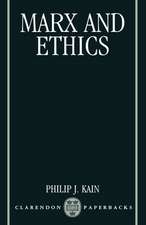Ethical Marxism: The Categorical Imperative of Liberation: Creative Marxism, cartea 01
Autor Paul R. Martinen Limba Engleză Paperback – 31 mai 2008
This book aims to reinvigorate the Marxist project and the role it might play in illuminating the way beyond capitalism. Though political economy and scientific investigation are needed for pure Marxism, Martin’s argument is that the extent to which these elements are needed cannot be determined within the conversations of political economy and other investigations into causal mechanisms. What has not been done, and what this book does, is to argue for the possibility of a rethought Marxism that takes ethics as its core, displacing political economy and "scientific" investigation.
Preț: 264.35 lei
Nou
Puncte Express: 397
Preț estimativ în valută:
50.60€ • 54.98$ • 42.53£
50.60€ • 54.98$ • 42.53£
Carte disponibilă
Livrare economică 31 martie-14 aprilie
Preluare comenzi: 021 569.72.76
Specificații
ISBN-13: 9780812696288
ISBN-10: 081269628X
Pagini: 479
Dimensiuni: 161 x 228 x 26 mm
Greutate: 0.65 kg
Editura: Open Court Publishing Company
Seria Creative Marxism
ISBN-10: 081269628X
Pagini: 479
Dimensiuni: 161 x 228 x 26 mm
Greutate: 0.65 kg
Editura: Open Court Publishing Company
Seria Creative Marxism
Notă biografică
Bill Martin is Professor of Philosophy at DePaul University in Chicago. He is a musician, cyclist, and chess enthusiast whose numerous previous books include The Radical Project: Sartrean Investigations (2001), Avant Rock: Experimental Music from the Beatles to Bjork (2002), and he is co-author of Marxism and the Call of the Future (2005).
Descriere
What role does ethics play in Marxism? Can ethical imperatives displace political economy at Marxism's core? In an age of rampant capitalism, can the vision of a free global society be kept alive? Bill Martin contends that these questions can't be answered within the cold confines of theoretical debate, but must be examined within a conversation of what is right and good. In arguing that the effects of capitalism cannot be judged solely by political and economic implications, Martin uses examples from science fiction as well as the real-world example of animal rights.

















